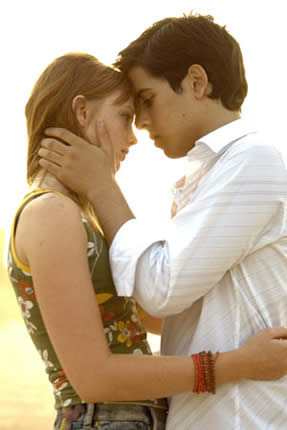It’s not easy to be a Moslem when you have to transform yourself into an Italian to get the attention of the ladies. It is summer and Gothia Cup, and the Italian team gets all the girls.The main character of Ciao Bella, Mustafa is kind, caring, ready for some action, but without a chance. So when opportunity knocks, he takes on the role as the slick”Massimo”, an Italian. An entirely new world opens up to him. Red-headed, beautiful, young and looking for anything more exciting than what’s going on in the world’s most boring suburb. What could be better than a gorgeous Italian in a white suit? Linnea and Mustafa/Massimo meet. They each have a secret of their own, something that makes this love story a bit more complicated. The young actors Poyan Karimi (Mustafa) and Chanell Lindell (Linnea) show that there are tough choices to be made as a teenager.
I met Mani Maserrat Agah, director of the Ciao Bella, at the Palm Springs International Film Festival. He was young, very humble, absolutely honest, and even a little sad. Mani did not believe he had a chance to make his second feature, but his charisma still reminded me of the wonderful and brilliant Italian comedy filmmakers of the sixties. Mani, originally an Iranian filmmaker, currently resides in Sweden. I hope he creates more films so and audiences around the world could see the growth of a young filmmaker and his sense of humor. 
Bijan Tehrani: How did you come up with the idea for Ciao Bella? Was it based on a real story?
Mani Maserrat Agah: Actually, I came up with the idea about seventeen years ago. It was 1991, and there was an American movie called “Not Without My Daughter”. I was sixteen years old, as Mustafa is in the movie. At that time, the Swedish girls’ attitude against people from Iran and Turkey were very different. As soon as you said you were from Iran, they would run away, because that was the image of Iranian men that Hollywood created. So what happened was, a lot of Iranian guys, before they went out to disco or to party, they had a system. The changed names, Abdullah became Alessandro, etc. They pretended to be Italian. It is a funny story, but for me it is also extremely tragic that you have to pretend to be someone else just to be loved. It is really a story set up by Hollywood. Our inspiration was also “Tootsie” and “Can’t Buy Me Love”.
BT: How did you pick up the actors and actresses? Are they professionals?
MMA: They are all ordinary people. For me, authenticity is very important. I really want people to feel—when they watch the movie—that these characters actually exist. I really wanted that authentic feeling, and I am quite pleased by it. The adults are professionals, but not the young ones.
BT: How challenging was making this film for you?
MMA: It was quite hard. The hardest thing actually is the financing, because Sweden is a small country. There is a legacy, including Ingmar Bergman, of course. We have very interesting filmmakers, and most of the movies have State funding. So you all have to fight over little money. It took mw four years from the idea to actually having the movie ready, and that was lucky.
 BT: How did you create the visual style of the film?
BT: How did you create the visual style of the film?
MMA: I am really inspired Mexican cinema, actually. I thought a lot about “Amores Perros”, and I sat there with Guillermo Arriaga, who wrote the script. A lot of Swedish movies have cold colors, but I wanted Ciao Bello to look like you are on your first vacation. Because when you are at the football tournament in Gothenburg, there are 50,000 young people from all over the world; so when you are there you feel as though it could be Istanbul, Prague, or any other city. Also, I was very inspired by Roy Anderson’s Love Story.
BT: What was the audience reaction like when you first screened it? Do you think the message of the film was absorbed?
MMA: I think so, and hope so. Things happen all the time, and a society grows. But the thing is, when an accident like September 11th happens, the development of society decreases. You go back in time. So you have to repeat these stories and let people meet, because as soon as this happens, people will go back to not being as fearful. And now we have the financial crisis, and it is so easy to blame it on the foreigners.
BT: Do you have any future projects?
MMA: Actually, I don’t know. I have two small kids, a four year old and a two year old, and it is really hard to make films. I have one thriller in mind and one dance movie in mind. But I don’t know if I will be able to do them, because it is hard to pay the rent and make movies [laughs].

